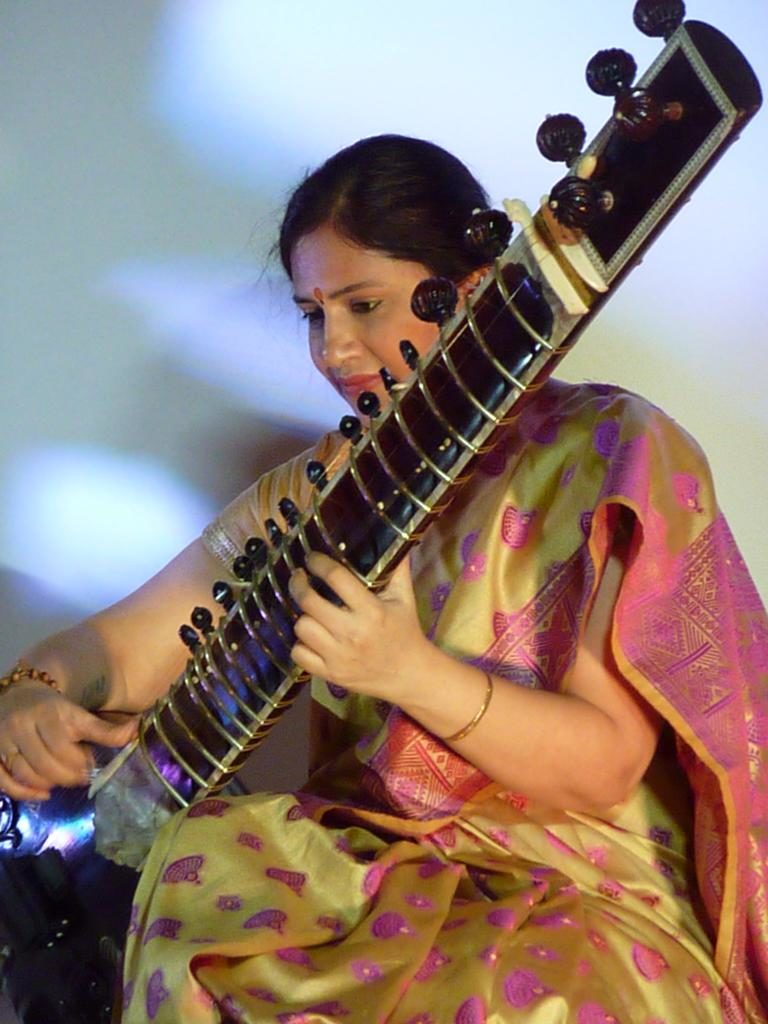Anupama Bhagwat

Spontaneous, versatile, grounded – some of these adjectives come to mind when one thinks of Anupama Bhagwat, the young Hindustani sitar player. Currently touring the U.K. and the U.S., she was one of the artists to participate at the prestigious Darbar Festival in London. Possibly the largest festival of its kind abroad, Darbar has showcased maestros such as ‘Chitravina’ Ravikiran, Aruna Sairam, Sudha Ragunathan, Ustad Shujaat Khan, Pt. Ulhas Kashalkar and Shashank as well as many younger artists, to sold out crowds.
This article appeared in The Hindu.
Women sitar players are rare, and a South Indian, more so. “The sitar requires stamina and correct technique is critical, particularly in the Imdadkhani Gharana which is known for its fluency, fast taans and meditative alaaps. I was honoured when my Guruji (Late Pt. Bimalendu Mukherji), upon listening to one of my concerts, said that one would have never known it was a woman playing,” says Anupama during an interview.
Performances have taken her all over the world including France, Switzerland, UK, USA, Canada, Bahamas, and Brazil. Besides being part of world music performances such as Global Rhythms and Shanti, she has presented many jugalbandis and ensemble events with Carnatic and Hindustani artists such as Sikkil Mala Chandrasekhar, Ranjani-Gayatri and Sikkil Gurucharan.
With enviable ease and versatility, Anupama traverses every programme with seemingly effortless skill, going with the flow of the concert and the mood of the audience, evidence of the rigorous taleem (training) she has undergone.
“Each of Guruji’s lessons had an individual character. He was adept at several instruments and it was not unusual to see him playing the rudraveena. Every lesson was different, based on his inclinations, onlookers’ requests etc. He had a keen appreciation of Carnatic music. Veena Balachander was a frequent visitor and a good friend and, in fact, passed away at my Guruji’s residence. Listening to academic discussions at a young age became part of my psyche,” she says.
Did she see herself as a performer at the onset? “Not at all,” Anupama says. “My childhood was conventional and completely normal.” She grew up in Bhilai in a Telugu speaking family, studied well, and took casual vocal lessons. Her uncle, a sitar player, gave her his old sitar as he was upgrading. Following basic lessons from R.N. Verma, she began training under Pt. Bimalendu Mukherji, a disciple of Ustad Enayat Khan (father of Ustad Vilayat Khan). In 1994, Anupama stood first in the annual All India Radio Competition. She was conferred the title ‘Surmani’ by the Sur Sringar Parishad in 1995.
“A good friend suggested that I present Anupama at Ambalam. I took him at his word and was pleasantly surprised by how simple and down-to-earth she was. The raagas she rendered to a packed audience and her gayaki style of exposition immediately brought back memories of Pt. Nikhil Banerjee. I made an instant decision to feature her in our mega event SaMaaGaMa. After many interactions, I am convinced that she is an artist who is all music, no frills. Her expositions are soaked with rasa, which stem from a samskaara beyond her age.”
TV Ramprasadh – Carnatic musician and CEO Ambalam Fine Arts
With concerts at the Ustad Amir Khan Smriti Samaroh (Indore), Swami Haridas Samaroh, Saptak (Ahmedabad), Sankat Mochan Samaroh (Varanasi), Sangeet Research Academy (Kolkata), Lotus World Music Festival (USA), MIT Fall Concert Series (USA), Baba HarBallabh Samaroh-Vasant Utsav (Jalandhar) and Uttarpara Festival (Kolkata), Anupama has established herself as a force to be reckoned with.
She has also taught several workshops in a multitude of platforms, universities, and conservatories. Arijit Mahalanabis, founder of the Seattle Indian Music Academy (SIMA), says: “As a teacher of music, and as a concert and workshop organiser, I’ve had the opportunity to meet many practitioners from virtuosos to beginners. Anupama’s music has a unique combination of youthful exuberance, highly refined technique, and a deep and mature insight that continuously provides fresh perspective. All this, and a nice and approachable person too! Attending her workshop with my vocal music students was a delightful and insightful event. I look forward to her return visit to SIMA, and to years of musical expression from this engaging artist.”
On the move
Prior to being Vice Chancellor of the Indrakala Sangeet Vishwa Vidyalaya, a pioneering University for music, Anupama’s guru, Pt. Bimalendu Mukherji, was a career engineer who retired as General Manager of Bhilai Steel Plant. However, for him, music was always at the forefront, and he would often say that it helped him handle life’s other challenges. This philosophy has been instrumental in Anupama’s own musical evolution. Unlike many who have stayed put in the city most propitious for their art form, Anupama has been on the move, constantly, in over 15 years as a performer.
Happily married with a six-year old son, she has gone wherever her husband’s job has taken them – several cities in the United States and India. “With will power, dedication and prioritisation, one can do full justice to music within day to day life – like breathing, it becomes essential for sustenance”, she concludes.